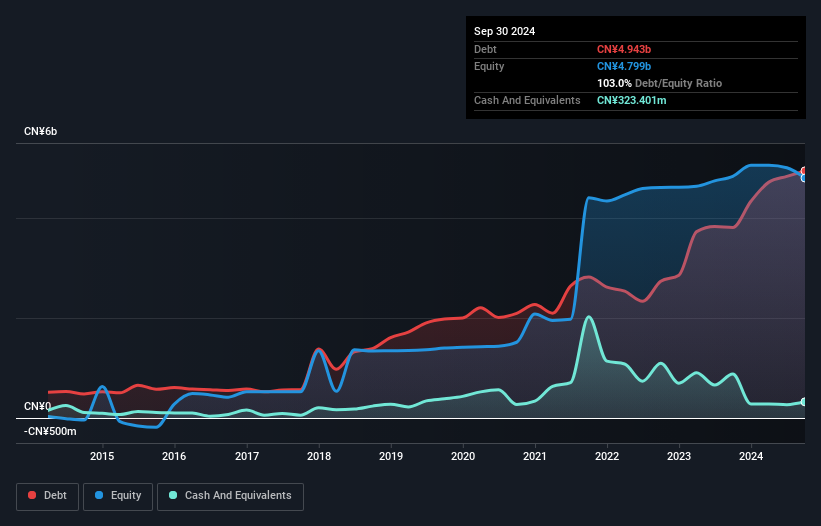Is Triumph New Energy (HKG:1108) Using Too Much Debt?
Warren Buffett famously said, 'Volatility is far from synonymous with risk.' It's only natural to consider a company's balance sheet when you examine how risky it is, since debt is often involved when a business collapses. We note that Triumph New Energy Company Limited (HKG:1108) does have debt on its balance sheet. But the real question is whether this debt is making the company risky.
We've found 21 US stocks that are forecast to pay a dividend yield of over 6% next year. See the full list for free.
Why Does Debt Bring Risk?
Debt and other liabilities become risky for a business when it cannot easily fulfill those obligations, either with free cash flow or by raising capital at an attractive price. If things get really bad, the lenders can take control of the business. However, a more frequent (but still costly) occurrence is where a company must issue shares at bargain-basement prices, permanently diluting shareholders, just to shore up its balance sheet. Having said that, the most common situation is where a company manages its debt reasonably well - and to its own advantage. The first thing to do when considering how much debt a business uses is to look at its cash and debt together.
Check out our latest analysis for Triumph New Energy
How Much Debt Does Triumph New Energy Carry?
As you can see below, at the end of September 2024, Triumph New Energy had CN¥4.94b of debt, up from CN¥3.81b a year ago. Click the image for more detail. However, because it has a cash reserve of CN¥323.4m, its net debt is less, at about CN¥4.62b.

How Strong Is Triumph New Energy's Balance Sheet?
The latest balance sheet data shows that Triumph New Energy had liabilities of CN¥4.92b due within a year, and liabilities of CN¥2.97b falling due after that. Offsetting these obligations, it had cash of CN¥323.4m as well as receivables valued at CN¥2.32b due within 12 months. So its liabilities total CN¥5.24b more than the combination of its cash and short-term receivables.
This deficit is considerable relative to its market capitalization of CN¥5.27b, so it does suggest shareholders should keep an eye on Triumph New Energy's use of debt. Should its lenders demand that it shore up the balance sheet, shareholders would likely face severe dilution. The balance sheet is clearly the area to focus on when you are analysing debt. But it is future earnings, more than anything, that will determine Triumph New Energy's ability to maintain a healthy balance sheet going forward. So if you want to see what the professionals think, you might find this free report on analyst profit forecasts to be interesting.
Over 12 months, Triumph New Energy made a loss at the EBIT level, and saw its revenue drop to CN¥5.6b, which is a fall of 13%. We would much prefer see growth.
Caveat Emptor
Not only did Triumph New Energy's revenue slip over the last twelve months, but it also produced negative earnings before interest and tax (EBIT). Indeed, it lost CN¥175m at the EBIT level. When we look at that and recall the liabilities on its balance sheet, relative to cash, it seems unwise to us for the company to have any debt. So we think its balance sheet is a little strained, though not beyond repair. However, it doesn't help that it burned through CN¥1.4b of cash over the last year. So suffice it to say we consider the stock very risky. There's no doubt that we learn most about debt from the balance sheet. But ultimately, every company can contain risks that exist outside of the balance sheet. These risks can be hard to spot. Every company has them, and we've spotted 1 warning sign for Triumph New Energy you should know about.
When all is said and done, sometimes its easier to focus on companies that don't even need debt. Readers can access a list of growth stocks with zero net debt 100% free, right now.
Valuation is complex, but we're here to simplify it.
Discover if Triumph New Energy might be undervalued or overvalued with our detailed analysis, featuring fair value estimates, potential risks, dividends, insider trades, and its financial condition.
Access Free AnalysisHave feedback on this article? Concerned about the content? Get in touch with us directly. Alternatively, email editorial-team (at) simplywallst.com.This article by Simply Wall St is general in nature. We provide commentary based on historical data and analyst forecasts only using an unbiased methodology and our articles are not intended to be financial advice. It does not constitute a recommendation to buy or sell any stock, and does not take account of your objectives, or your financial situation. We aim to bring you long-term focused analysis driven by fundamental data. Note that our analysis may not factor in the latest price-sensitive company announcements or qualitative material. Simply Wall St has no position in any stocks mentioned.
免责声明:投资有风险,本文并非投资建议,以上内容不应被视为任何金融产品的购买或出售要约、建议或邀请,作者或其他用户的任何相关讨论、评论或帖子也不应被视为此类内容。本文仅供一般参考,不考虑您的个人投资目标、财务状况或需求。TTM对信息的准确性和完整性不承担任何责任或保证,投资者应自行研究并在投资前寻求专业建议。
热议股票
- 1
- 2
- 3
- 4
- 5
- 6
- 7
- 8
- 9
- 10